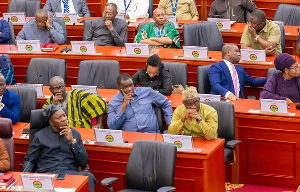Ghana Airways, the national airline owes about 160 million dollars to creditors, according to press reports. This massive debt, for an airline the size of Ghana Airways, threatens the existence and continued operation of the airline. To get the airline out of its present predicament, it has been reported that, the government is in negotiations to allow Nationwide Air of South Africa to take over the airline.
In an article published in the April 10, 2002 edition of the Chronicle, the employees, represented by the Ghana Airways Senior Staff Association (GASSA) and the local union members blamed the airlines woes on bad management. The article cited a litany of abuses and bad management practices at the airline. Based on my years of experience in the aviation industry and looking at the airline’s current condition, I have to agree with the employees’ assessment of their management’s performance over the years.
An article in the February 18, 2002 edition of the Daily Graphic said a New York bound aircraft was impounded in Dakar, Senegal for money owed and the Ghana government had to intervene for the aircraft to be released. There have been numerous reports in the Ghanaian papers of missing aircraft engines, ticket giveaways, bad accounting and a complete lack of corporate direction and focus. It is impossible for any business to operate profitably with these problems and even harder for an airline with its attendant non-discretionary fixed costs such as maintenance, recurring pilot training, insurance and other costs such as fuel and salaries that predominantly require payment in hard currency.
Some have tried to link Ghana Airways’ woes with the sad events of September 11, 2001 and the consequent decline in air travel mostly in the West. Some airlines based in the United States, Canada and Europe were without a doubt adversely impacted by the events of September 11. For other airlines with a long history of mismanagement, September 11 merely exposed the latent decay that had accumulated over time.
Other African Airlines have continued to do well even after September 11. Ethiopian Airlines, Kenya Airways and South African Airways all posted profits for the 2001/2002 fiscal year. Figures released by Ethiopian Airlines show no adverse effect on system wide passenger volumes as a result of September 11. Their passenger load factor for September 2001 was 66.5% compared to 65.4% for September 2000. Passenger load factor is the percentage of seats occupied by fare paying passengers as a fraction of the number of available seats. In July 2002, Ethiopian Airlines announced the carriage of a record 1 millionth passenger in a period of one year. It is clear that African airlines can be profitable.
There are several options available to the Government to get Ghana Airways out of its present financial state, including bailing the airline out by assuming its debt, allowing the airline to go bankrupt or finding private investors to take over the airline. It appears the government has chosen the later option.
If financially possible, Ghana Airways should remain in Ghanaian hands, even with some partial private sector ownership, for the reasons given in the following paragraphs:
- 1. Ghana Airways is a strategic asset for the nation. The airline would be an important cog on the wheel that will transform Ghana into a “Gateway to Africa”. It can be used as a tool to promote tourism and to attract businesses to locate in Ghana. Ghana Airways is the only airline that provides direct flights from North America to West Africa. When travelling from North America to West Africa, the typical four to five hour holdover in Europe makes the trip extremely difficult and time consuming. Given the choice, a large number of travelers will choose the direct flight.
2. As the Nation’s flag carrier, Ghana Airways represents Ghana wherever it flies to. Ghanaians, either through the government or private sources should maintain some measure of control over how they are represented by the airline.
3. Nationwide Air is a regional carrier and not a major international carrier like Ghana Airways. Nationwide started as a charter operator in 1991 and became an airline in 1995. Its operations are limited to the South African sub-region with a fleet consisting of 7 Boeing 737s and 3 Boeing 727s, which are all relatively short haul aircraft. The acquisition of Ghana Airways will put Nationwide in new and heretofore unknown territory. It could excel and it could flop, it is a gamble. I can foresee a reverse takeover if Ghana Airways had good management. At this point in its history, it is not unreasonable to expect Ghana Airways to have a strong regional airline operation.
4. Ghana Airways is in its current situation because it has been the victim of bad management. With good management and improved service, the airline could be profitable. The Accra to London and Accra to New York routes can guarantee high load factors to make the airline profitable. Any one who has tried to book a flight to Ghana this Christmas season will tell you how difficult it is to get flights to West Africa from North America. The same can be said for the summer travel season. Ghana Airways could fill that void if it could provide quality service at reasonable cost and on time.
5. It is tempting to look at Ghana Airways strictly in terms of its debt and other problems such as bad management and limited fleet while overlooking some inherent value in the airline. The airline’s landing rights at Heathrow in London and John F. Kennedy airport in New York and its Airline Operating Certificate represent value that some airlines will pay a lot of money for if they were for sale.
6. Airlines provide high quality, well paying technical, administrative and customer service jobs which benefit the Ghanaian economy. Any ownership decision must take the preservation of these jobs in Ghana into consideration.
To improve the airline’s performance, the equipment used and routes flown have to be rationalized. In the case of Ghana Airways, the aircraft in the fleet have to be reviewed and a determination made as to how much it costs per mile or kilometer to operate. Each piece of equipment has to be reviewed to determine how reliable it is. Unreliable equipment that keeps breaking down affects an airline’s ability to dispatch on time and ultimately customer satisfaction levels.
The age of aircraft is not a safety issue as long as all inspections and maintenance as published by the manufacturer are carried out on schedule. The issue however is these inspections and maintenance are expensive especially if carried out by external organizations. Ghana Airways management should have increased the airline’s maintenance capability over the years as a way to reduce cost and improve the airline’s on time dispatch percentages. The airline could save a lot of money by doing its own maintenance. Ethiopian Airlines and Kenya Airways are examples of African airlines with relatively high maintenance capability. Ethiopian Airlines perform large engine repair and overhaul, airframe and component repairs and major interval inspections (C check) at their home base.
The revenues generated from the routes flown have to analyzed. This analysis allows for the determination of which routes are profitable and which are not. Out of this analysis management can decide which routes need to be maintained and which routes have to be jettisoned. At the appropriate time, the addition of new routes also has to be looked at if they have the potential to be profitable.
Unfortunately, whenever there is a discussion on acquiring new aircraft for Ghana Airways, the major concern expressed by commenters is the cash outlay. An important aspect that is often missed is the revenue new equipment can generate. New aircraft are generally more fuel efficient, quieter and costs less in maintenance. The world’s best airlines view their aircraft as tools for conducting business to generate revenue, so new aircraft acquisition is viewed as an investment. The aircraft have to function as advertised and when required to provide the best possible service to customers.
It is easy to see how the combination of losing money and bad management would have prevented the airline from expanding and modernizing their fleet. It is instructive to compare the fortunes of Ghana Airways to that of Air Gabon. Air Gabon was designated as a national carrier in 1968, ten years after the inception of Ghana Airways. Gabon withdrew from the Air Afrique group and started operating its own international services from West Africa in May 1977. In 2001 Gabon Air announced plans to renew its entire fleet with state of the art Boeing airplanes including a Boeing 747-400 (the latest version of the jumbo jet). These aircraft have the latest cockpit instrumentation and passenger conveniences. The new equipment will make the airline much more competitive than Ghana Airways with its current fleet and debt situation.
My extensive review of African airlines lead me to believe that, with good management, Ghana Airways can be a profitable airline. Irrespective of what decision is made regarding its ownership, all the ingredients for a bright future are there to be exploited. The passenger complaints of tardiness, luggage left behind or lost and surly onboard service have to be addressed. The airline is not well but its condition is not terminal. It will become terminally ill if steps are not taken to breathe some life into the organization. The first step that needs to be taken is to install a new, knowledgeable and capable management team. The existing debt puts severe limitations on the options that will be available to the new management as they attempt to reverse the airline’s dwindling fortunes. The major challenge facing the new management will be to find creative ways of finding funding for the airline’s operations with or without government assistance.
Toronto, Canada

Views expressed by the author(s) do not necessarily reflect those of Ghanaweb.
Please send any comments or questions to:














